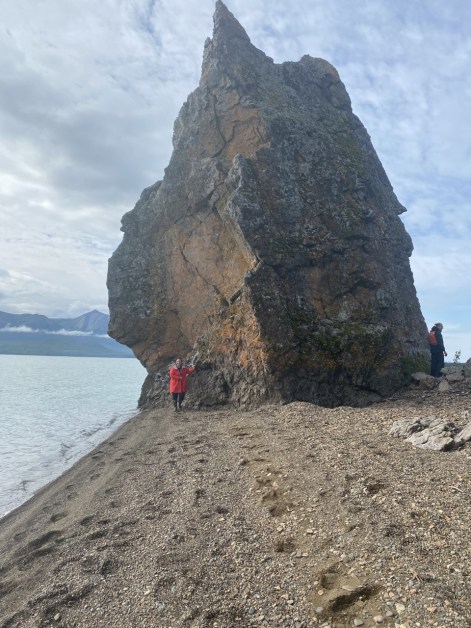Visiting Lake Clark: Camp Fire Provides Cold Water and Boating Safety

Back in July, the Nondalton Tribal Council invited two of Camp Fire Alaska’s staff members, Rural Program Operations Director, Marnie Stewart, and Si La Meo’s kayaking instructor, Gus Schmidt, to Lake Clark to provide cold water and boating safety lessons at an outdoor culture camp. The camp is called Quk’Taz’un, “The Sun is Rising”. Camp Fire attended the camp for four days and worked with 12 teens between the ages of 13 and 18. They worked alongside Michelle Ravenmoon and Karen Evanoff, two women who have run the camp for years, and several other specialists, including a linguists, archaeologist and videographers. The camps instructors provided various cultural training opportunities, such as learning how to tan moose hide, making a fishing net to catch salmon, boating, and the Dena’ina language.

Our program was originally contacted by Nondalton’s Tribal Council member Karen Evanoff, who works as a cultural anthropologist with Lake Clark National Park. The camp was looking for instructors for Quk’Taz’un who could bring the teens a range of activities to experience and help focus on the camp’s theme, which changes yearly. This year’s theme happened to align perfectly with Camp Fire: leadership. We were happy to share the cold water safety programming, training we were able to deliver due to our partnership with the Office of Boating Safety, and teach teens the ins and outs of kayaking.
Camp Fire’s Rural Alaska Program was first created to introduce cold water safety programs in response to rural Alaska’s elevated drowning rate. As we expanded our summer programming, we continued offering cold water safety and found that our reach with youth of all ages was growing and extremely impactful. Having this great opportunity to reach yet another group of youth with important safety lessons at Lake Clark was something we were very excited and grateful to do.
Marnie and Gus incorporated the theme with their water safety lessons by offering leadership opportunities to the youth. They taught them how to kayak and use the paddles correctly, ideas for safe clothing options to wear on the water, how to properly fit their life jackets, and then had them coach each other in order to put the lesson and their leadership skills into practice. It was a huge success.
“Every day the youth were really excited to get on the water,” says Marnie, our Rural Program Operations Director. “They were excited to point out different spots that they had been to in previous summers. There were a couple of people who were really quiet on the first day and by the third day, they were loud and cheering and so excited. It could have been pouring rain and they’d be like ‘LET’S GO!’.”

Our staff was enjoying the experience just as much as the teens. They mentioned how on the final day of kayaking, the group made it all the way to Priest Rock—a huge accomplishment and a new location for the youth to see. Marnie described how hard everyone worked and they felt so empowered at the end of it. They spent evenings around the campfire and were able to listen to Elders teaching the Dena’ina language and telling stories. They watched the youth show their deep respect to the Elders by always offering up their seats and bringing them meals before anyone else ate. And every time the group would take off to leave on their kayaks, Elders would take photos and cheer from the shore out of excitement that the teens were able to participate and learn an important skill.
It wasn’t just our Camp Fire staff and the teens who seemed to enjoy the lessons. On the last day, they met with the camp director who expressed an interest in having us come back to facilitate boating and cold water safety programming with adults.
Camp Fire Alaska is so thankful to have been invited to participate this year at Quk’Taz’un. We truly hope to return to Lake Clark again to continue building our relationships and strengthening water and boat safety skills, as well as to include some of our wellness curriculum. We are hoping to provide the same opportunity in other communities in future seasons.
If you are someone in rural Alaska who runs camp or is involved in youth development and you would like Camp Fire’s Rural Alaska Program to teach cold water and boat safety in your community, reach out to Marnie Stuart, our Rural Program Operations Director at 257-8817 or mstewart@campfireak.org
